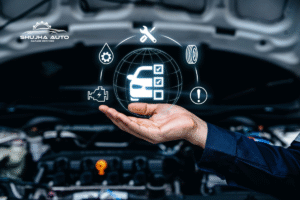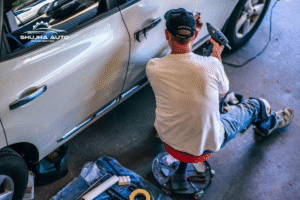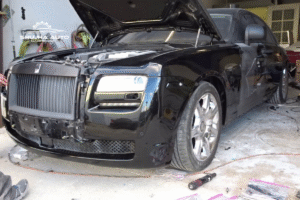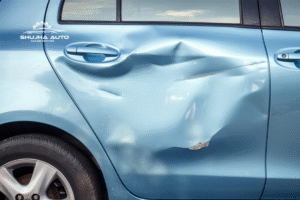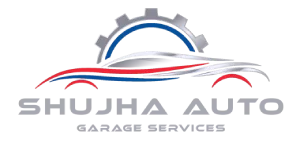Discover how I fixed my car jerks while accelerating problems with simple diagnostics and effective solutions to restore smooth driving.
If your car jerks when you accelerate, it’s unsettling. This problem can mess up your drive and show something serious is wrong. I’ll tell you how I found and fixed the issue so you can do the same with your car. Knowing what’s causing the problem is key to fixing it and getting your vehicle running right again.
Key Takeaways
- Recognizing symptoms of jerking during acceleration can help prevent further issues.
- Understanding common causes is vital for effectively resolving car acceleration issues.
- Diagnosing problems like dirty fuel injectors or faulty spark plugs can enhance your car’s performance.
- Using diagnostic tools can simplify troubleshooting and guide repairs.
- Regular vehicle maintenance can prevent future jerking problems in vehicles.
- Budgeting for repairs is essential in managing unexpected vehicle issues.
Understanding the Problem: Car Jerks While Accelerating
When your car jerks while you’re trying to speed up, it’s both worrying and annoying. This problem often shows up as a sudden drop in power. It makes your car shake when you try to go faster.
This issue can make your car act strangely, disrupting your drive. The shaking might feel different depending on whether it happens at slow speeds or on the highway. Knowing when it happens can help you figure out why it’s happening.
Also, ignoring this problem can be dangerous. You need to watch out for these signs to keep your car under control. Knowing the symptoms well helps keep you safe while driving.
Identifying Common Causes of Jerking During Acceleration
Feeling a jerk when you accelerate can be annoying. Knowing why this happens helps a lot. Many things can cause this problem, like:
- Engine misfires: A misfire can happen if spark plugs, ignition coils, or fuel injectors are not working properly. This can cause your car to jerk when you press the gas.
- Transmission issues: If your transmission has problems, like slipping gears or insufficient fluid, your car might jerk or not move smoothly.
- Fuel supply interruptions: If fuel filters are clogged or fuel pumps fail, your car might not get enough fuel. This can make it jerk when you try to speed up.
- Airflow restrictions: A dirty air filter can block air from getting to your engine. This can hurt your car’s performance and make it jerk.
- Faulty sensors: If sensors like the mass airflow sensor are not working right, your car might jerk or act strangely when you accelerate.
It’s essential to do a detailed check to determine why your car jerks. This way, you can figure out what’s wrong and fix it. By taking a careful step-by-step approach, you can find and fix the problem that is making your car jerk.
Dirty Fuel Injectors and Their Impact on Performance
Dirty fuel injectors can slow down your car. When they get clogged, they don’t mix fuel correctly, which can cause your engine to misfire.
You might feel a significant effect on car acceleration. This makes driving less smooth and less reliable.
It’s important to know when your fuel injectors are dirty. Look for signs like rough idling, less fuel efficiency, and less power when accelerating. If you see these signs, you need to act fast.
Clean or replace your fuel injectors often to keep your engine running well. This simple step can stop more significant problems and keep your car running smoothly.
Faulty Spark Plugs: A Hidden Culprit
Faulty spark plugs can cause much trouble, like the engine misfires when accelerating. Knowing the signs of worn-out plugs is essential to keep your car running well. Look for rough idling, less acceleration power, and lower fuel efficiency.
Spark plugs play a significant role in how your engine starts. They don’t fire right when they get old, leading to lousy combustion. This can make your engine misfire when you speed up, making driving harder. Not fixing these problems can lead to even more significant and expensive issues later.
Regular checks are key to avoiding spark plug problems. Depending on your car, you should look at your spark plugs every 30,000 to 100,000 miles. If you see any wear or damage, it’s time to replace them. If you’re unsure, getting help from a professional can keep your car running smoothly and prevent damage from bad spark plugs.
Clogged Air Filter: Assessing the Airflow Issues
A clogged air filter can slow down your car by blocking air to the engine. This can cause problems like jerking when you accelerate. You must regularly check your air filter for your car’s health.
Knowing when your air filter is clogged is key to keeping your engine running well. Watch out for signs like:
- Reduced engine power
- Increased fuel consumption
- Unusual engine sounds
- Decreased acceleration responsiveness
Changing your air filter often can stop airflow issues and make your car run better. A clean air filter boosts engine performance and saves fuel. Depending on how much you drive, you should replace it every 15,000 to 30,000 miles.
By doing this, your engine gets the air it needs for top performance, making driving smoother and more enjoyable.
Location: Please Visit Our Shujha Auto Garage
Checking the Mass Airflow Sensor (MAF)
The mass airflow sensor is key to your car’s engine. It measures air intake to ensure the right mix of air and fuel. If your car acts strangely or stalls, check this sensor first.
Symptoms of a failing mass airflow sensor include:
- Rough idling
- Poor acceleration
- Check engine light activation
- Increased fuel consumption
To find MAF problems, start with basic checks. Look for damaged wiring or loose connections. Use a multimeter to check the sensor’s voltage. You might need a new sensor to fix your engine if it’s off.
Vacuum Leaks and Their Effect on Engine Performance
Vacuum leaks can cause engine problems by causing your car’s air-fuel mix to become too lean when air enters the intake system without going through the mass airflow sensor. This can cause the car to jerk when accelerating, idle roughly, and lose power. It’s key for car owners to know how to find vacuum leaks.
To spot signs of vacuum leaks, look out for these:
- Unusual hissing or whistling sounds from the engine bay.
- Engine warning lights illuminate the dashboard.
- Increased fuel consumption without a change in driving habits.
There are several good methods for diagnosing vacuum issues. One is to look for cracks or loose connections in hoses. You can also use a smoke machine to find leaks. If you think vacuum leaks are the problem, fixing them quickly can improve your car’s performance and driving experience.
Diagnostic Tools for Troubleshooting Acceleration Issues
When your car jerks while accelerating, the right tools can significantly help. Automotive diagnostic tools are key to finding and fixing problems. OBD-II scanners are great because they read error codes and show how your car is running.
A multimeter is also helpful. It checks electrical parts that affect your car’s speed. Both tools help you find and fix issues with your car’s speed.
Here are some top tools for fixing car acceleration problems:
- OBD-II Scanners: These connect to your car’s computer. They show error codes and engine performance.
- Multimeters: They check voltage and continuity in essential systems that affect speed.
- Fuel Pressure Gauges ensure your fuel system works right for the best engine performance.
Each automotive diagnostic tool is essential for finding why your car jerks. Using good equipment helps you fix problems faster.
The Role of Shujha Auto Garage in Car Repairs
When your car jerks during acceleration, expert help is crucial. Shujha Auto Garage is a top choice for car repairs. They specialize in finding and fixing various car problems, making sure your vehicle is well taken care of.
At Shujha Auto Garage, skilled technicians use the latest tools to find the cause of your car’s jerking. They focus on quality service, offering solutions that fit your car’s needs. This improves your car’s performance.
Choosing Shujha Auto Garage makes car repairs easier. Their team can handle complex issues with ease, and working with trained professionals leads to safer and smoother driving.
For dependable car repairs, Shujha Auto Garage is a trusted name. They aim to keep your vehicle in top shape and ready to go whenever you need it.
Testing and Replacing Components as Needed
To keep your vehicle running well, it’s key to test its parts often. First, find out which parts might be the problem. Look at them closely and use tools to check how they work. For example, check the battery, ignition, and fuel system to see if they’re okay.
Watch for signs that parts need to be replaced. If your car stalls frequently, misfires, or doesn’t perform well, it might be a sign of trouble. Also, listen for strange noises, look for fluid leaks, or check the dashboard for warning lights. Fixing these issues early can prevent bigger problems later.
If you find parts that aren’t working properly, it’s time to replace them. Using good-quality parts will make your car last longer and work better. Always check your car’s manual to know which parts to replace and when.
Conducting a Test Drive to Assess Performance
A test drive is key after fixing or replacing parts in your vehicle. It helps you see if the problems are gone. During the drive, look closely at a few essential things.
- Responsiveness: See how fast your car moves when you press the gas. If it starts moving smoothly, it’s a good sign.
- Acceleration Smoothness: Watch for any sudden stops or slow starts. If it moves smoothly, the repairs worked.
- Engine Sound: Pay attention to any odd sounds from the engine. Normal sounds mean everything is working right.
- Braking Function: Test the brakes to make sure they work well without any weird vibrations.
After the test drive, you’ll know more about your car’s condition. This helps ensure your safety and that your car is running well.
Maintaining Your Vehicle to Prevent Future Issues
Regular vehicle maintenance is key to avoiding jerking during acceleration. A routine helps your car run smoothly and efficiently. Simple car care tips can significantly lower the risk of acceleration problems.
Here are some maintenance strategies to consider:
- Schedule regular oil changes to keep the engine lubricated and functioning optimally.
- Replace air filters at recommended intervals to maintain proper airflow.
- Check and clean fuel injectors to prevent blockages that can affect performance.
- Inspect spark plugs regularly to ensure they are in good condition.
- Examine the mass airflow sensor for any signs of defects or dirt.
Being proactive with these tips helps prevent acceleration issues and extends your car’s life. Regular checks and service intervals improve your driving experience.

Budgeting for Repairs: Costs to Consider
Understanding car repair costs is key when dealing with issues like jerking during acceleration. Budgeting for vehicle maintenance helps you financially prepare for repairs. It prevents unexpected costs. Many factors and expenses are involved in diagnosing and fixing these problems.
Labor costs vary based on the mechanic or auto shop. Hourly rates for skilled professionals range from AED 275 AED 550. The complexity of the issue affects the total labor time. For example, finding a faulty part may take less time than fixing multiple issues.
Parts pricing is also essential for your budget. Costs for common parts like spark plugs or fuel injectors range from $20 to several hundred dollars. It’s wise to shop around for the best prices. Local dealers may offer competitive rates, often for brand-specific parts.
Here are some budgeting tips for vehicle maintenance:
- Set aside a dedicated fund for vehicle maintenance expenses.
- Keep track of previous repairs to anticipate future costs.
- Regular maintenance can prolong your vehicle’s life and save money in the long run.
Having a solid budgeting strategy for vehicle maintenance eases financial burdens and improves your vehicle’s reliability. Successful budgeting also helps you handle unexpected car repair costs, ensuring your vehicle stays in top condition.
Learning from the Experience to Educate Others
Your journey of fixing car jerks while accelerating has taught you a lot. By sharing what you’ve learned, you help others who face the same problem. This not only reinforces your knowledge but also helps others feel more confident in fixing their cars.
There are many ways to share what you’ve learned:
- Talk to friends and family about your experiences. Your stories can make them more aware of car maintenance.
- Use social media to share tips and videos. This can help many people learn from your experiences.
- Join local car clubs or forums. These places are great for sharing knowledge and learning from others.
- Help organize or participate in car maintenance workshops. Your skills can teach others how to make repairs and prevent problems.
Sharing your knowledge can encourage a more active approach to car care in your community. Teaching others how to maintain their cars can make driving safer and more reliable for everyone.
Tips for DIY Enthusiasts to Fix Similar Problems
Learning to fix jerking during acceleration can save you money and time if you love DIY car repairs. First, get the right tools. You’ll need a socket set, screwdrivers, a multimeter, and a code reader. These tools make fixing your car at home easier.
Always prioritize safety. Wear gloves and goggles to protect yourself. Before starting, make sure your car is on a flat surface and the engine is cool. Use jack stands to lift the vehicle, not just a jack.
Here’s how to diagnose problems:
- Check the fuel injectors for clogs or leaks.
- Look at the spark plugs for wear or damage.
- Make sure the air filter is clean and working right.
- Check the mass airflow sensor for correct readings.
- Find any vacuum leaks that might hurt engine performance.
Following these steps can help you find and fix the jerking problem. Regular maintenance and DIY repairs can make your car run better and last longer. It’s a rewarding way to learn and fix your car at home.
Conclusion
Car jerks while accelerating can be caused by many things, including dirty fuel injectors, faulty spark plugs, and clogged air filters. Knowing what causes them can help you fix them and keep your car running smoothly.
Regular checks on your vehicle are key. Sometimes, you might need a pro’s help. Being smart about your car can save you money and time.
Staying informed and fixing problems quickly makes your car safer. Following these tips can avoid jerking issues and keep your vehicle in top shape.
FAQ
What are the common symptoms of a car jerking while accelerating?
Signs include sudden power loss, engine shakes, and rough performance. You might also hear strange sounds from the engine or transmission.
How can dirty fuel injectors affect my vehicle’s acceleration?
Dirty fuel injectors cause poor fuel mixing, leading to engine misfires. This makes your car jerk or hesitate, affecting its performance.
What signs indicate that spark plugs may be faulty?
Faulty spark plugs show hard starts, rough idling, and poor fuel efficiency. They also cause hesitation when accelerating. Regular checks can prevent these problems.
How often should I replace my air filter?
Check and replace your air filter every 12,000 to 15,000 miles. Your vehicle’s manual may have specific advice. A dirty air filter restricts airflow, hurting engine performance.
What is the role of the mass airflow sensor (MAF) in my engine?
The MAF sensor measures air intake, helping adjust the air-fuel mix. A failing MAF sensor can cause erratic engine behavior and jerking during acceleration.
How can I identify a vacuum leak in my vehicle?
Look for hissing sounds, fluctuating RPM, poor acceleration, and more fuel use. Diagnostic tools can help find the leak’s source.
What diagnostic tools are helpful in troubleshooting acceleration problems?
OBD-II scanners and multimeters are key for finding acceleration issues. They give error codes and real-time data, helping diagnose problems.
How can Shujha Auto Garage assist in resolving acceleration jerks?
Shujha Auto Garage specializes in fixing jerking issues. Their skilled technicians do thorough checks and effective repairs to improve your vehicle’s performance.
What should I do if my vehicle jerks after replacing parts?
Test drive your car after repairs to check performance. Watch for any jerking issues. If problems persist, consider revisiting repairs or seeking professional help.
How can regular maintenance help prevent jerking issues?
Regular maintenance, like oil changes and spark plug checks, prevents jerking. Keeping your vehicle well-maintained ensures a smooth drive.
What costs should I consider for diagnosing and fixing jerking problems?
The costs depend on the repairs and parts needed. Include labor, parts, and diagnostic fees in your budget for fixing jerking issues.


